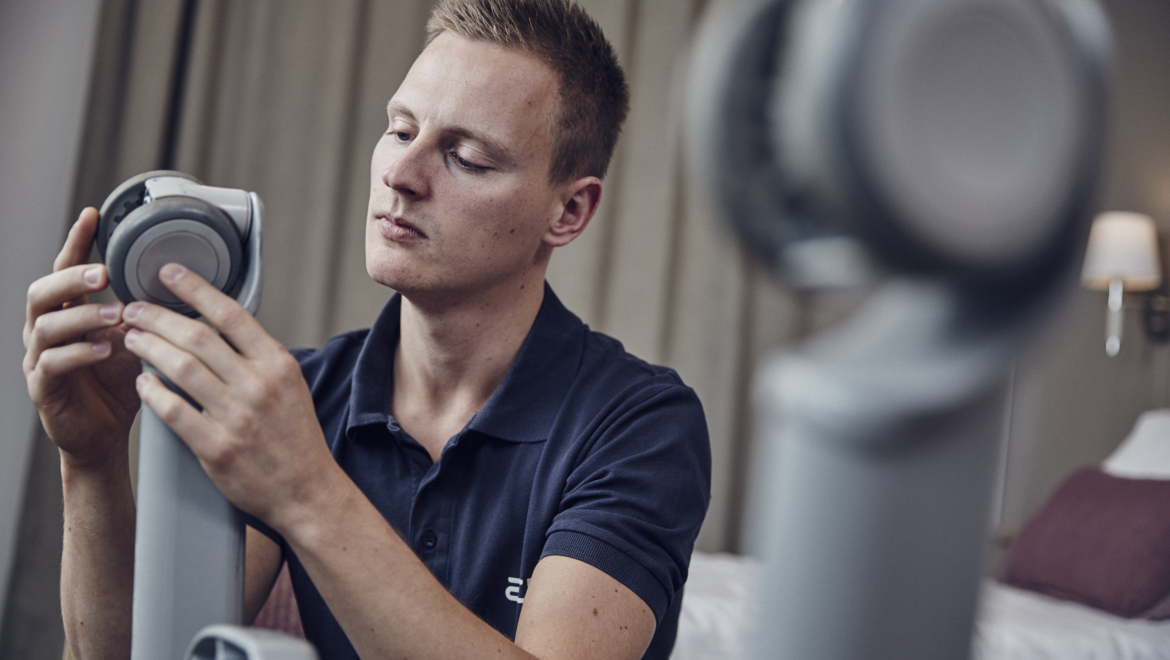Genuine Parts: No Part Too Small
Arjo technical experts weigh in on why each individual part that makes up our equipment plays an important role in supporting care that improves outcomes.
In simple terms, every part that makes up a piece of equipment must fulfil two requirements: to play its specific role, and to be compatible with the full equipment.
“Some products comprise over a thousand parts. Each of these parts interacts with all the other parts in the product, as well as the external power supply, the plumbing, and so on,” says Björn Hoveman, engineer manager for the research & development team in Malmö, Sweden. “That is why each part has to be tested not just to serve their specific function, but also to be compatible with all the other parts that make up the full piece of equipment.”

Taking castors, or wheels, as an example, Björn illustrates the many factors that go into selecting and validating it.
“You can find endless options of wheels, at many different price points, from many different sources. But the importance of using one that has been tested to work with the equipment cannot be overstated,” says Björn.
“It is not just using the right part that matters, but also the way it is installed. If the attachment is not secure enough, the wheel can come loose, or it might not bear weight evenly, and the product can tip. If there are weak points, it could fold or bend. If it is made with the wrong material it could warp or create uneven wear. If you only replace some but not all the wheels, there could be an imbalance.”
“When you use a genuine part sourced from Arjo, you can be confident that it has been tested in all these usage situations,” he adds.
“It’s hard to say one part is more important than another, but the integrity of each individual part can play a crucial role in the safety of a patient or caregiver,” says Andy Ellis, quality and regulatory compliance director for Arjo Western Europe.
“For example, if you are using a lifter connected to a clip sling, you’re bearing the weight of a person with the lifter, as well as with a clip, and a nylon strap. The nylon strap may need to be replaced more often than the lifter itself because if it starts to fray – if the stitching comes undone – it can snap and fail, and you’ll drop a patient who is in a vulnerable position.”

When it comes to equipment designed to support caregivers and people living with mobility challenges, safety is always a key concern.
“We’re so conscious of the fact that our equipment supports patients and caregivers, and we never want to put them at risk,” says Olivier Custeau-Boisclair, a design manager for Arjo patient handling equipment who is based in Magog, Canada.
“A critical factor is that our equipment is used for supporting or carrying people in some way. It’s very important that each part has been verified with the equipment, otherwise there is a risk that the equipment will not perform as it should.” says Björn.
“At best, an incompatible part can cause the equipment to become less energy efficient, or less convenient to use. At worst, the equipment could break and cause an injury or fall, which in some cases can lead to death. In that sense, insisting on genuine parts can be a life-saving decision.”
"Insisting on genuine parts can be a life-saving decision."
“We all have loved ones who are receiving care. Everything we recommend is strongly motivated by safety. We try and support our customers as much as we can, by detailing all the guidelines for maintenance in our instruction manuals, and constantly communicating these guidelines to them,” adds Andy.
“Even in pandemic times, we’re thinking outside of the box and working as closely as we can with our customers – for example with remote repairs or servicing the equipment outdoors – to make sure they can keep their patients safe.”
Though it makes his work more challenging, Jean-Philippe Boulianne, an Arjo design assurance manager in Magog, has been personally grateful on several occasions for the effort that goes into validating our products.
“I have elder relatives with dementia, or who have had to recover from a stroke, or from an injury, and I have heard about how they used an Arjo product and how that has impacted their lives,” says Jean-Philippe. “It makes me feel proud that Arjo makes products that gives them the assistance they need. What we’re doing really has an impact on people’s lives. I think we provide them with reliable and safe products so that I am not worried about my loved ones using them.”
“When we know all the effort that goes into validating that the equipment serves its purpose, and that it keeps patients and caregivers safe, I feel very confident to put my loved one in Arjo equipment,” adds Olivier.
Contact your local Arjo representative to ensure genuine parts are included in your service agreement.